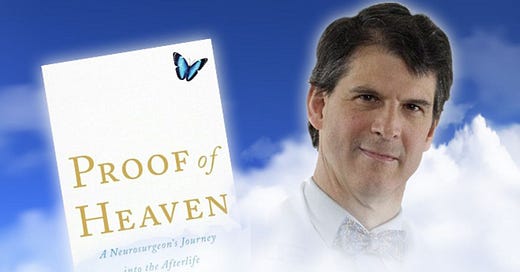Review of Proof of Heaven: A Neurosurgeon’s Journey into the Afterlife by Dr. Eben Alexander
Proof of Heaven is a deeply personal and thought-provoking narrative by Dr. Eben Alexander, a neurosurgeon who claims to have experienced the afterlife during a seven-day coma induced by bacterial meningitis. The book delves into his journey, both medically and spiritually, providing a unique blend of science and mysticism that challenges conventional ideas about consciousness, death, and the existence of an afterlife.
One of the book’s strengths is its scientific grounding. Dr. Alexander’s expertise as a neurosurgeon lends credibility to his account, making his experience more compelling for readers who might otherwise be skeptical of spiritual or metaphysical claims. He describes his coma as a time when his brain was severely impaired, making it unlikely, according to medical science, that his vivid and coherent experiences were mere hallucinations. This lends weight to his argument that consciousness exists independently of the brain—a central theme in the book.
The descriptions of the afterlife, which Alexander refers to as a “realm of consciousness” beyond space and time, are vividly rendered. He speaks of a beautiful, peaceful place filled with light, sound, and a profound sense of love, guided by a mysterious woman and communicating with an omnipotent presence. His depiction is intended to provide comfort and hope to those who fear death, and many readers have found solace in his words.
However, the book has faced significant criticism, particularly from the scientific community. Critics argue that Alexander’s account is subjective and difficult to verify. Some neurologists and skeptics point to well-documented cases of hallucinations, dreams, and other altered states of consciousness during comas, suggesting that Alexander’s experiences may not necessarily be proof of an afterlife. Additionally, the book’s blending of spirituality with science might alienate readers who prefer a clear delineation between the two.
On the other hand, *Proof of Heaven* resonates with those who are open to exploring spiritual perspectives or who have had similar experiences themselves. The book provides an accessible narrative that connects personal spirituality with a broader philosophical inquiry into the nature of life, death, and what might come after. It also offers a message of hope, love, and connectedness, which many readers find uplifting.
In terms of writing style, the book is engaging and easy to follow. Dr. Alexander writes in a straightforward, conversational tone, which helps demystify complex medical and philosophical concepts. The pacing is consistent, with alternating sections between his medical ordeal and his spiritual journey, keeping readers invested in both aspects of his story.
In conclusion, *Proof of Heaven* is a provocative and emotionally charged memoir that will resonate differently depending on the reader’s beliefs. For those inclined to believe in an afterlife or interested in personal accounts of near-death experiences, the book offers an inspiring narrative. For skeptics, it may raise more questions than it answers. Regardless of where one stands on the issue, it’s a book that invites reflection on the mysteries of life, consciousness, and what lies beyond.


